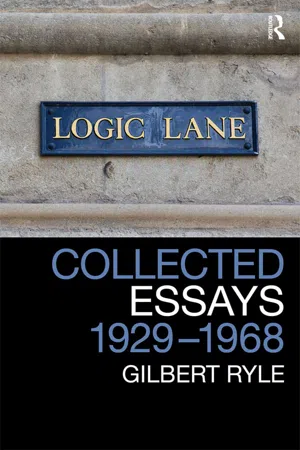
- 560 pages
- English
- ePUB (mobile friendly)
- Available on iOS & Android
About this book
Gilbert Ryle was one of the most important and yet misunderstood philosophers of the Twentieth Century. Long unavailable, Collected Essays 1929-1968: Collected Papers Volume 2 stands as testament to the astonishing breadth of Ryle's philosophical concerns.
This volume showcases Ryle's deep interest in the notion of thinking and contains many of his major pieces, including his classic essays 'Knowing How and Knowing That', 'Philosophical Arguments', 'Systematically Misleading Expressions', and 'A Puzzling Element in the Notion of Thinking'. He ranges over an astonishing number of topics, including feelings, pleasure, sensation, forgetting and concepts and in so doing hones his own philosophical stance, steering a careful path between behaviourism and Cartesianism.
Together with the Collected Papers Volume 1 and the new edition of The Concept of Mind, these outstanding essays represent the very best of Ryle's work. Each volume contains a substantial preface by Julia Tanney, and both are essential reading for any student of twentieth-century philosophies of mind and language.
Gilbert Ryle (1900 -1976) was Waynflete Professor of Metaphysics and Fellow of Magdalen College Oxford, an editor of Mind, and a president of the Aristotelian Society.
Julia Tanney is Senior Lectuer at the University of Kent, and has held visiting positions at the University of Picardie and Paris-Sorbonne.
Frequently asked questions
- Essential is ideal for learners and professionals who enjoy exploring a wide range of subjects. Access the Essential Library with 800,000+ trusted titles and best-sellers across business, personal growth, and the humanities. Includes unlimited reading time and Standard Read Aloud voice.
- Complete: Perfect for advanced learners and researchers needing full, unrestricted access. Unlock 1.4M+ books across hundreds of subjects, including academic and specialized titles. The Complete Plan also includes advanced features like Premium Read Aloud and Research Assistant.
Please note we cannot support devices running on iOS 13 and Android 7 or earlier. Learn more about using the app.
Information
Table of contents
- Cover Page
- Title Page
- Copyright Page
- Foreword
- Introduction
- 1 Negation
- 2 Are there propositions?
- 3 Systematically misleading expressions
- 4 Imaginary objects
- 5 ‘About’
- 6 Internal relations
- 7 Mr Collingwood and the ontological argument
- 8 Back to the ontological argument
- 9 Unverifiability-by-me
- 10 Induction and hypothesis
- 11 Taking sides in philosophy
- 12 Categories
- 13 Conscience and moral convictions
- 14 Philosophical arguments
- 15 Knowing how and knowing that
- 16 Why are the calculuses of logic and arithmetic applicable to reality?
- 17 ‘If’, ‘so’, and ‘because’
- 18 Heterologicality
- 19 Thinking and language
- 20 Feelings
- 21 The verification principle
- 22 Thinking
- 23 Ordinary language
- 24 Proofs in philosophy
- 25 Pleasure
- 26 Sensation
- 27 The theory of meaning
- 28 Predicting and inferring
- 29 On forgetting the difference between right and wrong
- 30 A puzzling element in the notion of thinking
- 31 Use, usage and meaning
- 32 A rational animal
- 33 Abstractions
- 34 Thinking thoughts and having concepts
- 35 Teaching and training
- 36 Thinking and reflecting
- 37 The thinking of thoughts: What is ‘le Penseur’ doing?